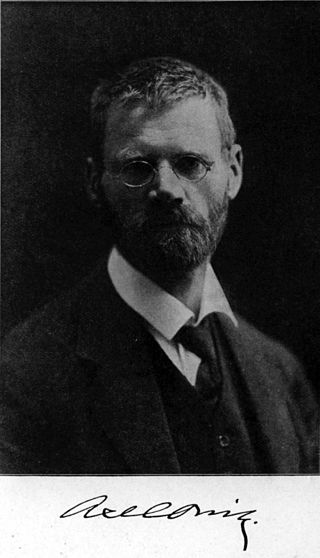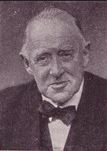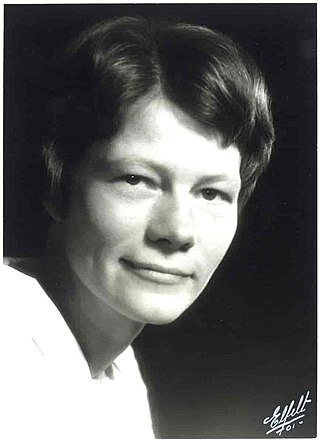Minna Skafte Jensen (born 19 May 1937) is a Danish philologist.
Minna Skafte Jensen (born 19 May 1937) is a Danish philologist.
She was born in Ryde as a daughter of priest Ankiær Hareskov (1903–44) and politician Meta Hjemdal (1912–2005). Spurned by her mother, she commenced studies of classical philology at the University of Copenhagen in 1956. She spent one semester at the University of Lund, before graduating with the cand.mag. degree in 1963. She then studied the Greek epic tradition in Copenhagen, Glasgow and Cambridge to graduate with the thesis Hovedlinier i de sidste årtiers Homerforskning, a study of the modern research on Homer. [1]
She was a lecturer at the University of Copenhagen from 1969. From 1974 she had a research grant to work with Androkli Kostallari and the Academy of Sciences of Albania. Following her doctoral dissertation The Homeric Question and the Oral-Formulaic Theory, she gradually established herself among the world's leading Homeric researchers. She became the first female professor in classical philology in Denmark when assuming this position at the University of Odense in 1993. [1]
In general literary history, she contributed to the multi-volume works Dansk litteraturhistorie and Verdens litteraturhistorie, also leading to the publishing of A History of Nordic Neo-Latin Literature (1995). She sat on the editorial board of the journals Oral Tradition and Classica et Mediaevalia. She was inducted into the Danish Academy of Science and the Norwegian Academy of Science and Letters. [1]
Politically, Minna Skafte Jensen aligned with communist Albania after working there, and was a board member of the Denmark–Albania Friendship Society until its dissolution in 1991. She was a member of the Socialist People's Party in the early 1970s. She was then a sympathizer of the Communist Workers Party (founded in 1976) and ultimately a member from 1981 of the Communist Party of Denmark/Marxist–Leninists (founded 1978). [1]
From 1959 to 1973 she was married to Jørgen Skafte Jensen. They had two daughters in the 1960s, and she also had a son in 1974. [1]

Ada Sara Adler was a Danish classical scholar and librarian.

Axel Olrik was a Danish folklorist and scholar of mediaeval historiography, and a pioneer in the methodical study of oral narrative.

Milman Parry was an American Classicist whose theories on the origin of Homer's works have revolutionized Homeric studies to such a fundamental degree that he has been described as the "Darwin of Homeric studies". In addition, he was a pioneer in the discipline of oral tradition.

The Homeric Question concerns the doubts and consequent debate over the identity of Homer, the authorship of the Iliad and Odyssey, and their historicity. The subject has its roots in classical antiquity and the scholarship of the Hellenistic period, but has flourished among Homeric scholars of the 19th, 20th, and 21st centuries.

Johan Ludvig Heiberg was a Danish philologist and historian. He is best known for his discovery of previously unknown texts in the Archimedes Palimpsest, and for his edition of Euclid's Elements that T. L. Heath translated into English. He also published an edition of Ptolemy's Almagest.

Count Flemming Valdemar Carl Axel of Rosenborg was a former Danish prince.

Lykke Friis is Prorector for Education at the University of Copenhagen and is a former Danish politician for the party Venstre and former Minister for Climate and Energy and equal rights. Prior to her political career she has once before been Prorector at the University of Copenhagen and held the position from 2006 - 2009. Prior to her appointment as government minister, she was not a member of Venstre.
Elizabeth Hume Minchin is an Australian classicist and former professor of classics at the Australian National University (ANU). Until 2014 she was one of the two editors of Antichthon, the journal of the Australasian Society for Classical Studies.

Dr. Hinrich Johannes Rink was a Danish geologist, one of the pioneers of glaciology, and the first accurate describer of the inland ice of Greenland. Rink, who first came to Greenland in 1848, spent 16 winters and 22 summers in the Arctic region, and became notable for Greenland's development. Becoming a Greenlandic scholar and administrator, he served as Royal Inspector of South Greenland and went on to become Director of the Royal Greenland Trading Department. With "Forstanderskaber", Rink introduced the first steps towards Greelandic home rule.

Vilhelm Rasmus Andreas Andersen was a Danish author, literary historian and intellectual, who primarily focused on the study of Danish literature. He was one of the first to use the term "Golden Age of Culture" to refer to the 1800s, and his focus on bringing Danish literature to the public earned him great popularity. Andersen was instrumental in the development of the School of Radio, as a means of disseminating public education to prevent loss of cultural identity and treasures.
Drude Dahlerup is a Danish-Swedish professor of Political Science at Stockholm University. Her main research area is gender and politics. She is an international consultant on the empowerment of women in politics and a specialist on the implementation of gender quota systems. Spokesperson for the EU-critical center-left June Movement during four Danish referendums in the 1990s.
Elisabeth (Lis) Jacobsen, née Rubin, was a Danish philologist, archaeologist and writer. She is remembered first and foremost for her research and publications on the history of the Danish language. Among other books, she also published a comprehensive analysis of all known runic inscriptions in Denmark. From 1911, Jacobsen played a major role in all fields of research related to the Danish language.
Margrete Tora Drejer was a Danish painter and textile artist who is remembered for the important part she played in teaching the art and history of sewing and textile decoration to women of all ages. Her own creations include textiles for churches as well as flags and banners.
Gerd Grubb is a Danish mathematician known for her research on pseudo-differential operators. She is a professor emerita in the Department of Mathematical Sciences at the University of Copenhagen, where she was the first female professor of mathematics.

Ingeborg Hammer-Jensen was a historian of science and classical philologist from Denmark. She was the third woman to be awarded a PhD in Denmark and was an expert on Greek scientific writing.
Ragna Marie Jenny Rask-Nielsen née Jensen (1900–1998) was a Danish biochemist and medical researcher. After she earned a PhD with a dissertation on the development of carcinogenic tumors in mice in 1948, she carried out laboratory-based studies on antibody-producing tumors. In 1963, her groundbreaking work on viruses causing cancerous lymphoma was published in the journal Nature. When she died at the age of 97, she left her large fortune to a research foundation.
Kela Beate Kvam was a Danish academic and writer. She was employed as an associate professor at the Nordic Institute at Odense University from 1967 to 1974 and was later working as the first female professor of theatre studies at her alma mater, the University of Copenhagen, between 1974 and 2001. Kvam oversaw the creation of the Documentation Centre for Nordic Group Theatre that sought to get political theatre movement material and involved her students in working and gathering source material. She contributed to collections such as the Dansk kvindebiografisk leksikon, co-edited and co-authored the two-volume Dansk Teaterhistorie, and established the Nordic Theatre Studies journal of which she was its editor-in-chief. Kvam was appointed Knight of the Order of the Dannebrog in 1988.
Gurli Vibe Jensen was a Danish missionary, priest and writer. She was a teacher in Copenhagen before joining the Danish Sudan United Mission as a missionary in 1949. Jensen did missionary work in Nigeria from 1950 to 1960 before becoming a liaison secretary for Sudan Mission in 1962 with the task of fomenting interest in non-church circles doing missionary work. She became ordained as a chaplain at the large Church of the Holy Ghost, Copenhagen that is located in the centre of Strøget in 1965 and was made a priest between 1974 and 1995. Jensen was vice-president and member of the European board of the United Bible Societies from 1976 to 1980 and was its world chair and board member between 1980 and 1984.
Eva Skafte Jensen is a Danish linguist and researcher at the Danish Language Council.

Tove Birkelund was a Danish geologist who specialized in historical geology. She is remembered internationally for her research into the fossils of extinct squid-like species, including belemnites and ammonites, which she investigated in Denmark, Greenland and several other countries. She played a leading role in the Danish research community, serving as a member of the Danish Research Council for Natural Sciences and of the Carlsberg Foundation. From 1966 to 1986, Birkelund was professor of historical geography at Copenhagen University's Geological Institute.